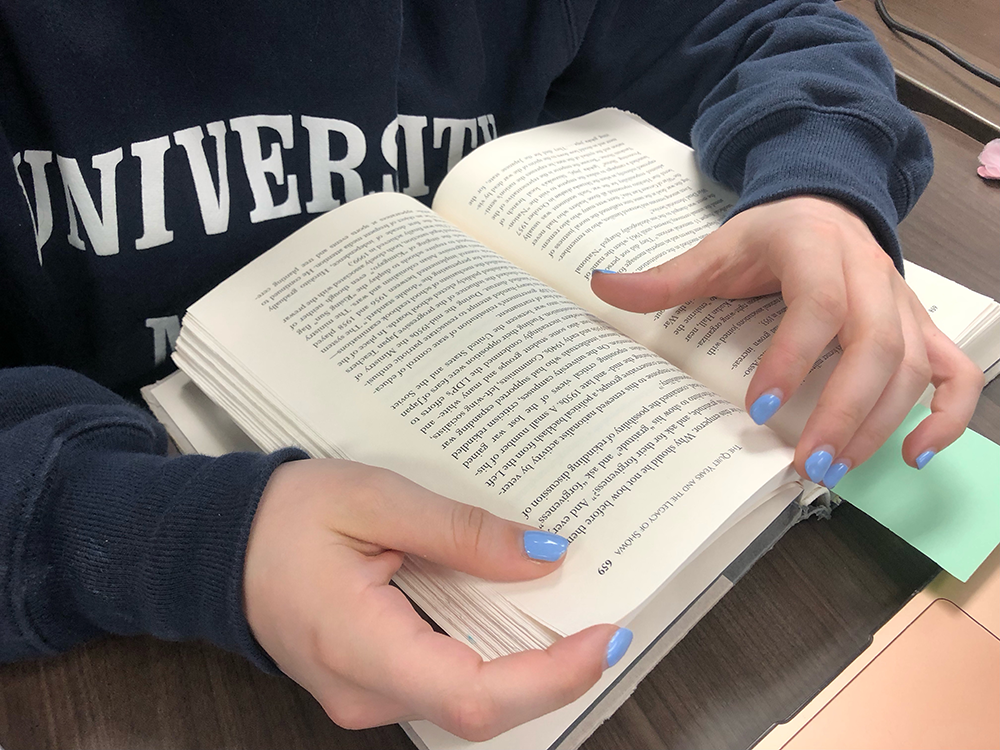In an age inundated with addictive technology and distracting applications, it has become increasingly difficult to engage in simple activities. Focus and discipline have become elusive qualities. But with repetition and perseverance, we can rediscover the simpler aspects of life. An especially important practice that many have strayed from is reading. Although a seemingly simple task, the practice of reading is difficult in today’s climate of constant media consumption.
But why is reading still relevant? Is it not an antiquated practice, unnecessary in this age of immediate information? Our culture heavily values the factual elements of life: scientific data, math and statistics. Within these disciplines, reading often becomes wholly irrelevant. The value of reading is then, in turn, diminished within our larger culture. Reading, however, teaches skills that are invaluable to all disciplines. It teaches sentence structure and grammar and can exponentially expand vocabulary. Literature can articulate multiple perspectives in disciplines such as history. Erik Larson’s historical non-fiction novel “Devil in the White City” provides the reader with a stunningly vivid image of the Chicago World’s Fair of 1893 while simultaneously following a plotline of murder and mystery. Additionally, reading can teach life lessons and, in the case of Jane Austen’s writing, simultaneously be amusing. Austen’s novel “Emma” follows a rich girl who readily engages in matchmaking schemes, making mistakes and learning from them along the way. Although the many functions of reading may not always be obvious, their value is irreplaceable. Reading is a skill that will always be important and should be practiced more readily.
Following these simple steps might make this daunting task feel lighter:
- Find a book you’ll enjoy
Pick a book you’ll actually enjoy reading. Although reading sometimes should be difficult, enjoying it first will increase the likelihood that you will stick with it. Begin by browsing genres online or in a bookstore and find one that catches your eye. If you like hiking, you might want to pick up Jon Krakauer’s “Into the Wild” or Bill Bryson’s “A Walk in the Woods: Rediscovering America on the Appalachian Trail.” If you’re leaning more toward the self-help genre, Mark Manson’s “The Subtle Art of Not Giving a F***” is a good place to start. Perusing the ratings online can help you get a sense of the difficulty of your book, as well as if others enjoyed it.
- Obtain a hard-copy
Although it can be tempting (and cheaper) to buy a book online, obtaining a physical book has irreplaceable benefits. It’s harder to get distracted if you’re not reading on a screen. With a hard copy, you can also write in the margins or highlight specific passages you enjoy. Many also opt to listen to audiobooks during their commutes, which is great in the interest of multi-tasking.
- Set a daily goal
Even if it’s just for 10 minutes a day, set a goal for how much you want to read. It’s a good way to hold yourself accountable and will leave you feeling accomplished. Plus, once you start reading, it’s probable that you will become so immersed that you’ll end up reading over your goal.
- Read with friends
Start a book club or jointly read with a friend. The practice of reading is much more engaging when there’s a discussion element included. You can compare ideas, share dissenting opinions, and ask questions. It’s fulfilling simply to point out a sentence you liked or dialogue you found amusing.
- Create a Goodreads account
Goodreads is a free, online website that is dedicated to all aspects of reading. It allows you to track what books you’ve read, rate them, read others’ comments and ratings, set goals for yourself and more. It’s a great way to measure your progress.
- Take an English class
If you’re a student trying to fulfill general education requirements, take a literature class. Not only will it give you a deeper understanding of an extensive array of literature, but the class discussions will allow you to further investigate your thoughts on the books.
- Challenge yourself
Read books that you’ve always wanted to read but have not had the confidence to. As mentioned in Step 1, it’s good to start slow. Pick a book that isn’t too lengthy or difficult. Slowly you’ll be able to work your way up.
Books can be checked out for free at Fogler Library at the University of Maine or at the nearest public library. Additionally, many libraries categorize books into specific sections or genres, which can be helpful when finding a book you want to read. Happy reading!










